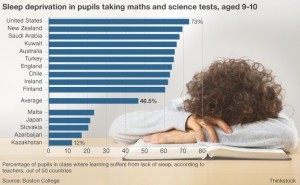Sleep deprivation is a significant hidden factor in lowering the achievement of school pupils, according to researchers carrying out international education tests. It is a particular problem in more affluent countries, with sleep experts linking it to the use of mobile phones and computers in bedrooms late at night.
Sleep deprivation is such a serious disruption that lessons have to be pitched at a lower level to accommodate sleep-starved learners, the study found.
The international comparison, carried out by Boston College, found the United States to have the highest number of sleep-deprived students, with 73% of 9 and 10-year-olds and 80% of 13 and 14-year-olds identified by their teachers as being adversely affected. In literacy tests there were 76% of 9 and 10-year-olds lacking sleep. This was much higher than the international average of 47% of primary pupils needing more sleep and 57% among the secondary age group.
I – Word Understanding
Blight – to damage
Disruption – cause to be unable to continue in a normal way
Pitch – to adjust (lower or higher)
Adversely affected – affected in a bad or negative way
II – Have your say
1.Japan is one of the countries with the best record of getting enough sleep (for students).
2.Ex-British prime minister Margaret Thatcher was thought to have as little as 4 hours of sleep during her leadership of the country, and Thomas Edison, creator of the modern light bulb, spent long periods awake with limited effects.
3.Some people have uncontrollable sleepiness that they fall asleep anytime and everywhere. They are often attacked with excessive sleepiness despite having enough sleep. This disorder is called Narcolepsy



